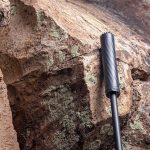About 50 outdoor retailers and suppliers and retailers joined the OIA Government Affairs team in Washington, D.C. for the 2009 Capitol Summit, which was held from April 21 to 23. Ten lobby teams met on the Hill with close to 90 members of Congress and/or their staffs. While the new administration is still getting up to speed, the congregation was reassured that the prospects for increased funding for recreation amenities, parks and trails on public lands are brighter now than in the past eight years.
“The consensus was that the change of administration brought with it a new receptivity in Washington toward the industry and issues close to it – such as public lands conservation and getting youth reengaged with the outdoors,” said Sutton Bacon, CEO at Nantahala Outdoor Center, one of the attendees.
The new administration had already shown its support for the outdoor industry as public land funding was allotted $4 billion in the recently-passed $787 billion stimulus package under the American Recovery and Reinvestment Act. But the group was particularly encouraged to hear U.S. Interior Secretary Ken Salazar-a keynote speaker at Wednesday's morning presentation-voice his support of outdoor recreation through a proposed Treasured Landscapes Initiative modeled after the Great Outdoors Colorado program that aims to expand federal funding for local parks and community open spaces.
“The administration recognizes the mental and physical health benefits of getting outdoors, and the White House staff indicated President Obamas interest in a program that calls for young people to spend a “Summer of Service” possibly working on trails and campsites on our public lands to improve the country and for the health and well-being of the young people themselves,” said Sam Solomon, CEO and president of The Coleman Co.
Amy Roberts, vice president of government affairs for the Outdoor Industry Association, also said Sec. Salazar discussed the importance of finding a balance on the management of public lands (from resource extraction to preservation).
“Secretary Salazar is working diligently to ensure that the value of recreation on public lands is recognized and preserved,” said Roberts. “He is also seeking to fund a new initiative which would increase funding for open space, river restoration, recreation greenbelts and parks near local communities across the country. Finally, Sec. Salazar is very focused on increasing the role of renewable energy sources on public lands (solar and wind) specifically. He asked the outdoor industry to support him in this effort.”
Michael Colllins, VP of public affairs at REI, was encouraged that the “quality of meetings” continues to improve year after year as Congress recognizes that the outdoor industry as a “significant” voice not only public land funding issues but on business issues. He likewise admitted to being “pleasantly surprised” to hear Salazar's comments and efforts in creating the “the next generation of outdoor users.”
But Collins also stressed that while the new administration appears more supportive of outdoor causes, “it's going to take a bipartisan approach to really make it all work. You have to work with both sides.”
Solomon believes the good response at the summit underscores the $730 billion contribution the outdoor industry makes to the U.S. economy as well as the health benefits it delivers to Americans. “We were able to outline the role government plays in support of the industry, by providing the infrastructure for iconic and local parks and trails systems that enable people to get outside,” said Solomon.
On trade issues, Roberts said the outlook “is more complex with new regulations on environment and labor coming from Congress.” But Roberts added that with the outdoor industry's strong history of environmental consciousness, members of Congress “are very interested in our work to manufacture products more sustainably.”
Alex Boian, OIA's Director of Trade Policy, said attendees delivered the message that outdoor companies and OIA together stand as one of the few industries that successfully balance business interests with environmental responsibility. “The industry's credibility in that regard makes outdoor companies and OIA the ideal partners for policymakers as they seek to incorporate increased environmental standards into trade policy,” said Boian.
Specifically, Capitol Summit attendees promoted and sought Congressional support for the US Outdoor Act, which is OIA's proposed legislation that would reclassify certain kinds of performance apparel in the U.S. Harmonized Tariff Schedule and will eliminate tariffs on those new classifications. The legislation also reflects OIA's message of balancing business and environmental priorities by establishing the Sustainable Textile and Apparel Research (STAR) Fund, an investment in US-based research and service organizations that focus on sustainable textile and apparel supply chains.
Attendees also met with Senator Feinstein's office concerning her proposed eco-label bill and encouraged Congressional support and passage of the Affordable Footwear Act and encouraged legislators to consult with the outdoor industry as they develop legislation related to consumer products, such as product safety, other product regulation, import and export issues.
Jeff Tooze, director, global customs & trade at Columbia Sportswear, and chairman of the recently-formed OIATAC (OIA Trade Advisory Council), said the outdoor industry can serve as a “bridge” between the environmental groups that are having increasing influence over trade and business policy (CPSIA, Lacey Act, Eco label bill) and the general business community that bears the costs of increased regulation. “Probably the best part of the whole summit each year is working together with our business partners and competitors for a common interest: making outdoor recreation more accessible and affordable, and implementing practices to ensure that when people participate in outdoor recreation, their experience is a positive one and that they will want to return,” he said.















